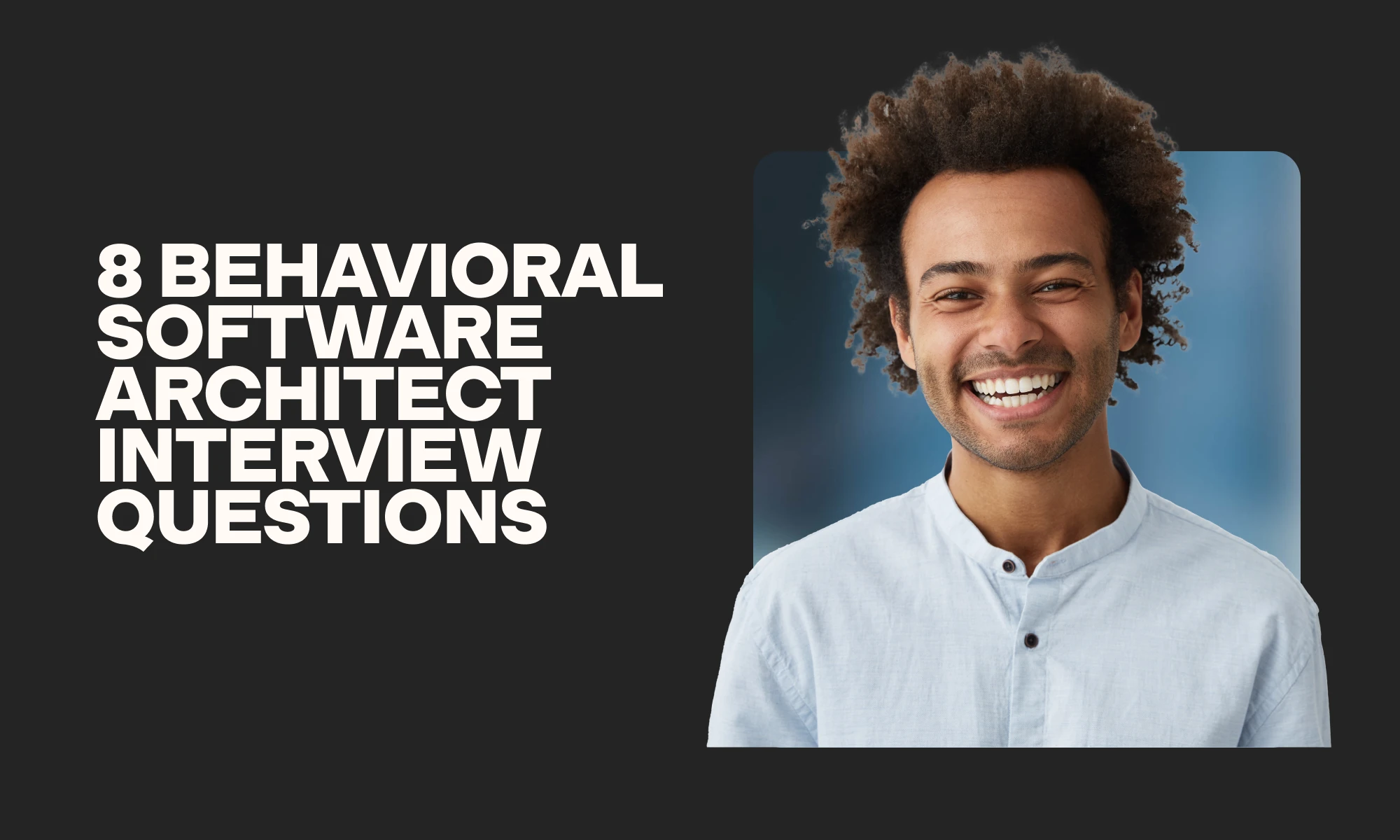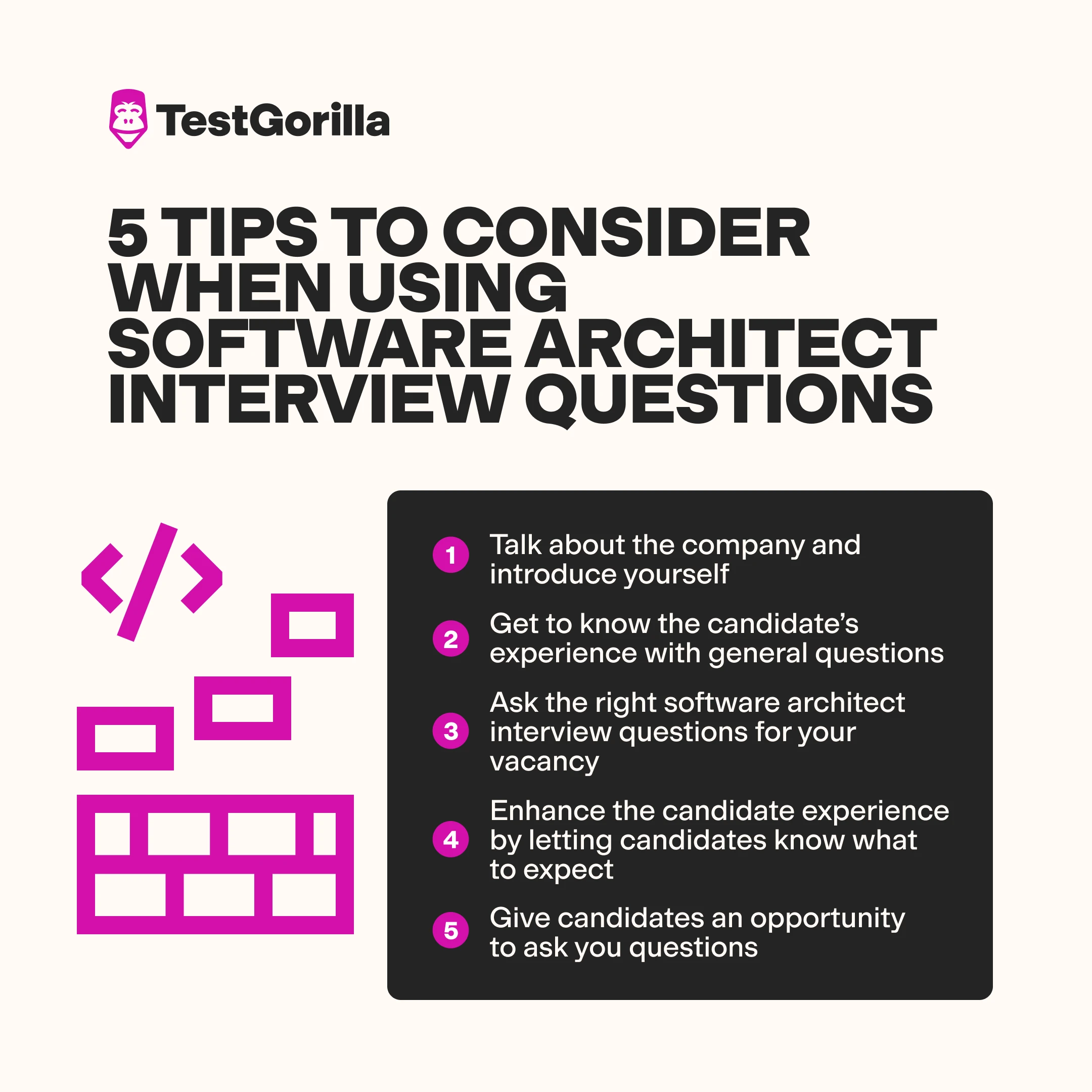If you’re searching for a software architect to lead your development team and oversee software engineering projects, there are a few steps to consider during the hiring process.
The first step is to create a compelling software architect job description that attracts qualified candidates. After that, you need a comprehensive evaluative method to assess your applicants.
The second step is to ask applicants to complete a skills assessment so you can evaluate their software architect skills. The third step is to prepare for the interview phase.
With that in mind, we’ve drawn up 72 software architect interview questions you can ask candidates to probe their suitability for your role before making a hiring decision. Let’s take a look.
Table of contents
- 14 beginner software architect interview questions
- 5 beginner software architect interview questions and answers
- 8 behavioral software architect interview questions
- 5 behavioral software architect interview questions and answers
- 26 intermediate software architect interview questions
- 5 intermediate software architect interview questions and answers
- 24 advanced software architect interview questions
- 5 advanced software architect interview questions and answers
- When should you ask software architect interview questions?
- 5 tips to consider when using software architect interview questions
- Get started on your list of software architect interview questions
14 beginner software architect interview questions
To start off, here are 14 software architect interview questions to ask applicants who are just entering the profession.
What do software architects do?
Explain what load balancing is.
Explain what the CAP theorem is.
What is the advantage of WebSocket?
What does “lower latency interaction” mean?
What does “fail early” or “fail fast” mean in software architecture?
Explain what scalability is.
Explain what a cluster is.
Why is clustering significant?
Explain what a domain-driven design is.
Explain what KISS means.
Explain what test-driven development means.
Which technical skills are required to be a successful software architect?
Which soft skills are required to be a successful software architect?
5 beginner software architect interview questions and answers
In this section, you’ll find answers to five of the software architect interview questions above that you should be listening out for from your candidates.
1. What do software architects do?
Software architects are expert, professional developers who share information between software engineering teams and clients to implement precise software design solutions. Some of their primary responsibilities are:
Project code QA testing
Task distribution for software engineer teams
Technical standards evaluation
Breaking down project goals into deliverable tasks
2. Explain what KISS means.
KISS means “keep it simple, stupid.” In the software architect field, KISS implies that a system will function best when a developer or architect takes a simple approach to designing. It suggests that architects should avoid complex designs.
3. Explain what the CAP theorem is.
CAP theorem suggests that distributed computer systems can only deliver two out of the following three guarantees:
Consistency: Every node sees the same data even when concurrent updates occur.
Availability: All requests receive responses on whether it was a success or a failure.
Partition tolerance: The system will keep operating even if there is a partition in communication between two different nodes.
4. Which technical skills are required to be a successful software architect?
As well as knowledge of unified modeling language (UML), software architects need to have skills in various programming languages. They should also understand agile management and collaboration methods so they can align development and operations.
5. Which soft skills are required to be a successful software architect?
A crucial soft skill for software architects is effective leadership, but there are other essential skills, too. Some other soft skills required to be a good software architect include:
Coaching abilities
Prioritization skills
8 behavioral software architect interview questions
In this section, you’ll find eight behavioral software architect interview questions that you can ask candidates to find out how they might behave in work-related scenarios.
What has been your most significant achievement in your software architect career to date?
What has been your most challenging project?
What are your favorite programming languages?
Which features do you dislike about your favorite programming language?
Which programming languages have you used extensively?
How do you stay up to date with the latest developments in the software architect field?
Have you ever failed when completing a project? What did you learn from the failure?
What is your approach to delegating tasks?
5 behavioral software architect interview questions and answers
Here we’ve selected five of the behavioral software architect interview questions listed above and identified potential answers. Listen out for responses like the ones below.
1. How do you stay up to date with the latest developments in the software architect field?
Some of the best approaches to stay up to date with the latest developments in the software architect field include:
Reading technical books
Working on side projects
Reading blogs
Completing courses
2. What are your favorite programming languages?
Each candidate may have a different response to this question, or they may not have a clear favorite. But it’s vital that your candidates can give rational and clear explanations for their choices.
For instance, if they don’t have a favorite language, they may explain that certain languages are better for particular projects.
3. Have you ever failed when completing a project? What did you learn from the failure?
Each of your candidates will likely have experienced a time when they couldn’t complete a project. But they should have learned from the failure. For example, a candidate may describe a project they managed that was particularly big and complicated.
They may have had to coordinate between several teams, and although the project wasn’t as successful as hoped they may have learned valuable techniques to handle complex coordination.
4. What is your approach to task delegation?
It’s essential to get the right balance between delegating all tasks and completing every task without team support. Individual initiative is vital, but so is relying on your team.
The candidates you should watch out for are those who explain clearly that keeping an eye on the team and the tasks that have been delegated is important.
5. Which features do you dislike about your favorite programming language?
Candidates may respond in a variety of ways to this question. But in general, the more limited their response, the lower their level of expertise is likely to be.
For example, suppose a candidate points out that there are whitespace delimitations to Python code blocks. In that case, they may not fully understand the complexities of this programming language’s style and philosophy.
26 intermediate software architect interview questions
Here are 26 intermediate software architect interview questions to help you determine whether your candidates have the right skills for the role.
Explain what elasticity means.
How is elasticity different from scalability?
Explain what back-pressure is.
Which is the best choice for real-time data: WebSockets or Rest API?
What is Microservices Architecture?
What is Monolithic?
Explain what session replication is.
Explain what middle-tier clustering is.
Explain what sticky load balancing is.
What is session affinity?
Explain high availability in the software architect field.
What is the single responsibility principle?
What does fault tolerance mean?
What does fault resilience mean?
Explain the difference between fault tolerance and fault resilience.
What is concurrency?
What is parallelism?
Explain how concurrency is different from parallelism.
What is the DRY principle?
What is the DIE principle?
Explain what SOLID means.
Describe four best practices for performance testing.
Describe three metrics that measure performance testing.
Explain the ACID acronym.
What is a binary semaphore?
What is a mutual exclusion semaphore?
5 intermediate software architect interview questions and answers
For the following intermediate software architect interview questions, we have provided the answers you should listen out for from your candidates.
1. What is the DRY principle?
DRY means “don’t repeat yourself.” This principle is used in software development to keep software pattern repetition to a minimum. Instead of repetition, data architects replace redundancy with abstractions or data normalization, and the DRY principle makes it easier to maintain code.
2. What is the DIE principle?
DIE in software development is an acronym that means “duplication is evil.” The DIE principle is used in the same situations as the DRY principle and aims to ensure that software architects and developers avoid duplicating concepts. It also contributes to efficient code maintainability.
3. Explain what SOLID means.
The SOLID acronym features five principles for software architect and development roles. These principles are:
Single responsibility: This principle indicates that each class should be responsible for a specific part of an application.
Open/closed: The open/closed principle indicates that although a module or class should be open for extension, it should be closed for modification.
Liskov substitution: The Liskov substitution principle indicates that if developers use inheritance when designing an application, it should function with an object created using the parent class or a subclass.
Interface segregation: The interface segregation principle indicates that software developers and architects should keep interfaces small.
Dependency inversion: The dependency inversion principle suggests that a high-level class shouldn’t rely on a low-level class, though both can depend on high-level abstractions.
4. Explain the ACID acronym.
The ACID acronym means “atomicity, consistency, isolation, and durability.” These database interaction properties help software developers and architects guarantee the validity of data, even when errors occur.
5. Describe four best practices for performance testing.
Four best practices for performance testing include:
Defining the scope and making a plan
Testing components together and separately
Sticking to agile approaches
Testing early and frequently
24 advanced software architect interview questions
Here are 24 advanced software architect interview questions you can ask your candidates following the skills assessment to learn if their skills match your open role.
Explain what sharding is.
Explain why layering an application is vital.
Explain what YAGNI means.
How is YAGNI different from the KISS principle?
Explain what cache stampede means.
Explain what shared nothing architecture is.
Should “low” application layers be aware of “high” ones? Why, or why not?
What is the “robust” software building approach?
What is the difference between the “fail fast” and “robust” software building approaches?
Explain heuristic expressions.
Explain what cohesion means in software architecture.
Explain what coupling means in software architecture.
What is eventual consistency?
Explain what the GOD class is.
Why should you avoid the GOD class?
Explain what a unit test is.
Explain what an integration test is.
Explain what a regression test is in the software architect field.
Explain what a smoke test is in the software architect field.
What are threads?
Explain what starvation is in the software architect field.
Explain what a deadlock is.
Explain what a livelock is.
Explain the difference between deadlock and livelock.
5 advanced software architect interview questions and answers
Here, we’ve selected five advanced software questions from the list above and added answers that you should listen out for when interviewing your software architect candidates.
1. Explain what YAGNI means.
YAGNI is a principle of software development and software architecture design. It means “you aren’t gonna need it” and refers to the concept that programmers should only add features when strictly required.
YAGNI principles are used during continuous refactoring, continuous integration, and continuous unit testing, helping to reduce reworking and technical debt.
2. Explain what sharding is.
Sharding is a method software architects use to split and store one logical dataset within several databases. Such distribution in several machines facilitates the ability to store a bigger dataset.
3. Explain what cohesion means in software architecture.
When software architects divide a system into modules, cohesion measures the extent to which all elements that belong to the module are functionally related. Some of the main types of cohesion include:
Communicational cohesion
Functional cohesion
Sequential cohesion
Procedural cohesion
Temporal cohesion
Logical cohesion
Coincidental cohesion
4. Explain what coupling means in software architecture.
Coupling refers to the extent to which each module, or each component, depends on another module.
If two modules are tightly coupled, they are highly dependent on each other. If they are loosely coupled, they don’t rely on each other as much. If two modules are uncoupled, they are not interdependent.
There are many different examples of coupling in modules:
No coupling
Content coupling
Common coupling
Control coupling
External coupling
Stamp coupling
Data coupling
5. Explain why layering an application is vital.
Layering the architecture of an application is critical because it makes it easier to add additional features.
It’s also much simpler to make changes to the most current features since a software architect will know what all the individual parts of the application do.
When should you ask software architect interview questions?
We’ve mentioned that using a skills assessment is a critical part of evaluating candidates, and this stage must come before you use software architect interview questions.
Following this order ensures you avoid unconscious bias when making a hiring decision. It also helps you mitigate lengthy time-to-hire metrics, reduce your chances of mis-hiring, and ensure your candidate is a good fit in terms of the values they will add to your organization.
Make sure that pre-employment skills assessments are distributed straight after candidates begin responding to your job ad. When you receive the results, you can then compare your applicants.
5 tips to consider when using software architect interview questions
There are five vital tips that you should consider when using software architect interview questions. We have listed them below.
1. Talk about the company and introduce yourself
Introducing yourself and the company is important to ensure your candidates remember your brand.
Give them the details about what your company does and describe the team they would be working with. This enhances the candidate experience and can be a factor that contributes to a promising candidate’s final decision.
2. Get to know the candidate’s experience with general questions
Before you ask any technical software architect interview questions, get to know the candidate’s previous experience. Take note of whether they have had similar responsibilities to those required for your open role.
3. Ask the right software architect interview questions for your vacancy
We recommend that you use beginner software architect interview questions for junior roles, intermediate questions for mid-level positions, and reserve advanced interview questions for senior roles.
Asking inappropriate software architect interview questions can affect the candidate’s experience, so ask questions suited to the role you are filling.
4. Enhance the candidate experience by letting candidates know what to expect
Explaining how the interview will proceed is one way of easing your candidates into the interview. It will enhance the candidate experience and ensure they give their best answers.
For example, if you plan to begin by talking about the company and continue by asking about the candidate’s past experience, let your interviewee know what to expect before you start.
5. Give candidates an opportunity to ask you questions
Towards the end of the interview, switch roles with the candidate and invite them to ask questions about the team, company, and the position.
You should be prepared for any interview questions they may ask and answer honestly to give candidates an accurate picture of your organization.
For example, your candidates may ask about career progression opportunities and how this works at your enterprise. The process might involve completing career progress documentation and monitoring performance, so try to convey this as accurately as possible.
Get started on your list of software architect interview questions
Hiring a software architect for your organization is not easy.
There are many skills to evaluate, and the recruitment process can be complex. However, you can make things simpler. Just draw up your comprehensive list of software architect interview questions, selecting from those we have provided in this article.
Remember to use your list of software architect interview questions after you have received the results of your applicants’ skills tests, as this will shorten the hiring process and increase the chances of hiring exceptional talent.
Start hiring an expert today with software architect interview questions and skills assessments provided by TestGorilla.
Get started for free today and start making better hiring decisions, faster and bias-free.
Related posts
Hire the best candidates with TestGorilla
Create pre-employment assessments in minutes to screen candidates, save time, and hire the best talent.
Latest posts
The best advice in pre-employment testing, in your inbox.
No spam. Unsubscribe at any time.

Hire the best. No bias. No stress.
Our screening tests identify the best candidates and make your hiring decisions faster, easier, and bias-free.
Free resources
This checklist covers key features you should look for when choosing a skills testing platform
This resource will help you develop an onboarding checklist for new hires.
How to assess your candidates' attention to detail.
Learn how to get human resources certified through HRCI or SHRM.
Learn how you can improve the level of talent at your company.
Learn how CapitalT reduced hiring bias with online skills assessments.
Learn how to make the resume process more efficient and more effective.
Improve your hiring strategy with these 7 critical recruitment metrics.
Learn how Sukhi decreased time spent reviewing resumes by 83%!
Hire more efficiently with these hacks that 99% of recruiters aren't using.
Make a business case for diversity and inclusion initiatives with this data.






















